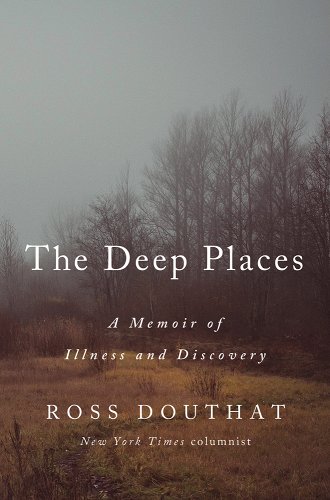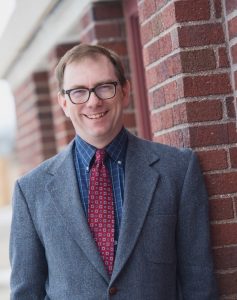This is the thid essay in a three-part series of reflections on Ross Douthat’s recent book The Deep Places. You can find the first two here and here.
Aberdeen, SD. It all started on a cold February day nearly three years ago. We’d gotten a significant snow the night before, so when I came home for lunch I fired up the snowblower and cleared out the driveway and sidewalk. Pressed for time, as I had class that afternoon, I quickly wolfed down some lunch, hustled back to campus, and started to teach.
I could tell something was wrong. I felt bloated, an unnatural pressure in my left abdomen. Not untypical for a “man of my age” who had eaten a bunch of food too quickly. Also, with a history of back troubles, I figured I had just tweaked my back moving snow and, as is not unusual, was getting referred pain in my side. But as class went on it got worse and worse. Finally I dismissed class fifteen minutes early and went home. I usually walk to school, but because I had been pressed for time I had driven that afternoon. Pulling onto our street I was behind the steering wheel nearly doubled over in pain. I went into the house, collapsed on the floor of the living room, certain that something in my side was about to rupture. Let’s not get too graphic, but after about ten minutes of excruciating pain my stomach emptied itself, and I felt much better.
A day or two later we went out with friends. I had a big meal. No problem. I chalked it up to a one-time incident of eating too much after physical exertion. Then about a week later it happened again. And then again. Perhaps something was wrong.
This is the point at which unless I wish to write a book like Ross Douthat’s The Deep Places, I’d better start summing up. I was enthused when I discovered the subject of Douthat’s book. First, because I read every book Douthat writes. Second, because, like many of his readers, I was surprised to find out that Douthat has spent the last handful of years fighting chronic illness, in his case Lyme Disease. I knew I’d be able to relate.
Mine has been a three year journey of ill health which is not yet resolved. My bouts of severe stomach pain became less acute, but more frequent. In the last few months before a real diagnosis, I was having an attack three to five times a week. And episodes were getting longer. Instead of twenty minutes of blinding pain and then relief, it would be forty, fifty minutes, two hours of deep discomfort until a few good belches relieved the pressure. The sensation was that my stomach was bloated and ripping my diaphragm (which turned out to be sort of true). I lost entire afternoons and evenings, doubled up in pain after lunch or supper. I had already lost significant weight after switching to a low carb diet. Now I was losing even more. I learned to eat very small meals and to avoid eating and drinking at the same time.
Douthat details his long and winding road through the medical profession, struggling even to get a diagnosis. Despite having acute life-changing, nearly life-destroying, symptoms, Douthat’s tests results didn’t quite check every box, leaving his doctors flummoxed. Only after moving to Connecticut, where he likely had contracted the disease while shopping for a new house, did he receive a proper evaluation, now among doctors more familiar with Lyme.
I went two years without diagnosis. Despite endoscopies, an abdominal ultrasound, a CT scan (before which my doctor informed me, “We really don’t want to find anything with this test”), and two barium swallow tests (two, because for the first one the doctor’s nurse had ordered the wrong kind of test), I was diagnosed with a paraesophageal hernia. My family doctor detected a problem in the second (correct) barium study and sent me to a specialist in Sioux Falls. The specialist told me, “I don’t know why they ordered that barium study. I could see the hernia clearly on the CT scan.” Essentially most of my stomach had poked its way up into my chest and wrapped itself around the esophagus. The gastroenterologist was astounded I could digest at all, and I was essentially malnourished. While it’s a bit melodramatic, eventually this was going to kill me, although I was reliably told that the intensity of pain prior to that terminal stage would have had me seeking life-saving medical care. But there was a distinct possibility that my stomach would die. (Yes, you can live, quite unpleasantly, without a stomach). Surgery was the only solution. The Monday after graduation in May, 2021, I was on the operating table. Like most surgery, it was unpleasant, but there was the promise of recovery. Finally, back to normal. Or so I thought.
Douthat describes his entry into the murky world of “alternative medicine,” so desperate is he to alleviate his pain. He takes pills, herbs, supplements, drawers full of bottled remedies doing little to no good. The most desperate and amusing option Douthat pursues is the Rife machine. This device emits electromagnetic waves. The claim is that certain frequencies are effective at fighting any number of ailments. Douthat goes from scoffing skeptic to eventually purchasing a Rife machine. To his surprise, it actually brought relief.
I did the same. No, not a Rife machine. Essential oils. Sage extract. Enzyme pills. Foot zoning. Acupuncture. This was in addition to various prescription medications meant to limit stomach acid. In hindsight these were all foolish. None of them were going to unwrap my stomach and put it back in place. But before my eventual diagnosis I was desperate. Like Douthat, I have grown even more skeptical of “traditional” medicine than I was previously. Fortunately, my family doctor is open to various alternatives (in fact it was he who years ago suggested acupuncture for my back problems). He knows they won’t do any harm and might end up doing some good. The body is an enigmatic thing. We don’t have it all figured out. I didn’t really believe in any of these remedies, but as Douthat attests, when one is desperate, one’s epistemic vistas begin to widen. And you know what, foot zoning was never going to cure me, but I did feel better for a while after each treatment. Maybe it’s not all quackery.
Douthat has learned to live with his Lyme Disease. After years of trial and error, by the end of the book (and I gather through interviews) Douthat, while not really being “healthy,” is mostly functional. After my surgery I was naturally on a restricted diet. I lost even more weight, getting down to data points on the bathroom scale I had not seen in thirty years. But eventually I could eat more and more, getting to the point where, after two years of meals being a game of Russian roulette, I could actually enjoy food again.
But then new symptoms arose. Again, this is a family website, so no need to go into details. Let’s just say I began to experience regular intestinal acrobatics. More tests. More drugs. More scopes. More confounding of the medical profession. I am assured this issue has nothing to do with the previous one. To this day I have no diagnosis. What we know is that there is a particular antibiotic that seems to control my symptoms, although we don’t know why. Doctors have been unable to detect any actual intestinal infection. And believe me, they’ve looked. Really thoroughly.
So I have more tests scheduled. Due to oddities in my bloodwork, in just over a week as I write this I will have won the “you get a liver biopsy” contest. Another procedure. Another day blown. Yet more medical bills to “rule something out.” And why do I get the feeling the results will be, “We didn’t find anything”? (To be fair, it’s not clear which is better, finding something or not). So I muddle on, now nearly three years from my first stomach episode with a whole new round of “guess what’s wrong with this guy” in my future. I seldom really feel “good,” but at least I am not in pain. I can generally eat what I want, although my inexplicable liver quirks have caused me to swear off alcohol (well, mostly). If I was going to describe my current health condition, I’d say the appropriate descriptor is “blah!”
Here’s what I have learned in these three years, much of it jibing with Douthat’s own account. Those of us in education often lament the segmentation of knowledge, the notion that learning is cordoned off into particular areas called “subjects.” Here you learn politics. There you learn history. In that building they teach biology. The university is really a multiversity of various people, working in their proverbial silos, with very little opportunity to bring the experience of learning into a unified whole. The same is true for health care. Any number of times I have found myself in the doctor’s office thinking, “Don’t you people talk to each other?” Each doctor has his/her part of the body, but few are looking at the whole thing (again, my family doctor is a notable exception). There is also the keen sense that health care is interested in profit via volume. The more patients they see the better. I fantasize about getting the various experts in a room and having a good brainstorm session where we figure out what the heck is wrong. But instead it is one twenty-minute consult after another, much of which consists of me repeating what I’ve said a dozen times. I have often gotten the vibe, in person or on the phone, that I am wasting these people’s very valuable time.
My experience as a regular consumer of American health care is that it is not very efficient. But there is one exception to that. If the medical side of health care gave me the time and attention that the billing side does, I’d be right as rain. Those whose job it is to extract money from me have given me very direct, personal attention. We can let CT scans and barium tests slide, but when it comes to collecting the bill, we are second to none!
One thing that Douthat does not have to struggle with, living in Connecticut and within spitting distance of New York City, is the experience of being sick in rural America. I am blessed that my small town has two hospitals. The basic care here is quite good. But we lack in specialists. The hospitals are not large, and specialists are not generally drawn to a place that will pay them less, is a bit remote, and, frankly, is dang cold in the winter. So while we have some specialties that are well-represented (for example, orthopedics and obstetrics/gynecology), in my case there is no gastroenterologist or hepatologist in town. Oh the joy of the three hour drive for the twenty-minute consult in Sioux Falls! This contributes to the tardiness of diagnosis. The real experts are two-hundred miles away. It takes a day off of work just to talk to someone. How many people in rural America suffer from some chronic illness, readily diagnosable and treatable, simply because of the lack of expertise? Yes, there is tele-medicine. But as with distance “education,” there is no substitute for literal hands on healthcare. Part of the delay in my own situation stemmed from the fact that doctors here know that “You need to go to Sioux Falls” or “You need to go to Mayo” (six-hour drive) represents a burden of its own. I recently had to rearrange two days of my life merely to get a twenty-minute colonoscopy by a specialist.
Beneath these critiques of the American medical system and the biological mysteries of the human body throbs a more existential question: How does one deal with suffering? These are some of the most moving parts of Douthat’s book. He finds himself literally prostrate before the altar seeking some meaning in his suffering. I have not quite found myself in those extremities of anguish, but I recognize the sentiment. In the first week after surgery, which found me miserable, I asked a priest friend what it means to “offer it up,” that phrase often dropped regarding suffering. I confessed that I really did not know in practice how precisely to do this. His advice was sound. Think of some person you know who might also be struggling. Offer some of your suffering to God on that person’s behalf. I can’t claim to be consistent in this practice, but I have found it helps mitigate against the self-pity to which I am prone.
At the end of Douthat’s “memoir of illness,” as the book’s subtitle puts it, he reflects on what it means to be a father and be sick. He laments that his afflictions have limited his ability to be fully paternal to his young children. Sometimes the pain was paralytic. Even when he wasn’t crippled by pain, the weariness caused by constant battle against the Lyme bacteria left him giving his children his second best. Yet, he reflects, it could be worse. As his states in the book’s closing sentence, he is still alive. While he perhaps cannot be the active, vibrant dad of the fatherly ideal, still, he is there.
I already suffer under the burden of being “old dad.” I am fifty and have four children ranging in age from four to (any day now!) thirteen. Parenthood is a young man’s game. I was already limited by age and various old injuries in my ability to play ball, roughhouse, even get on the floor and play a board game. I now think of the hours spent in bed over the last few years, curled up in pain, that could have been spent doing something with my children; the number of times I have had to say, “Sorry, I just don’t feel well”; the things I’d like to do for them but am not sure I am physically able, such as drive my kids to the Grand Canyon. I guess my children are not getting the full dad-treatment that most of their friends with younger fathers get. But I am here. I am still alive. That’s worth quite a lot.






1 comment
Brian
Thank you for writing and I hope you find relief.
What are the most famous cliches about medicine/doctors:
“An apple a day keeps the doctor away”–eat healthy, your health is in your own hands.
“Take two of these and call me in the morning”–there’s really not much the doctor can do for you that rest and your own body can’t do.
“Get a second opinion”–always ask for input from someone else, because doctors aren’t perfect any more than any other profession is.
Somehow all this that we’ve always known got jettisoned in the past two years. We all know the root cause of the hysteria. The question is if history will point the blame correctly, or if it will all be forgotten/covered up.
Comments are closed.